Over 80 Volunteers of 11 BEC Member Companies Help Avoid Refuse to Landfills
Hong Kong, 12 Dec 2017 - Business Environment Council Limited 商界環保協會有限公司 (“BEC”) launches its “Guide to Energy Efficient Retrofits of Office and Hotel Buildings: identifying cost effective solutions” and “Retrofit Calculator” today at BEC Auditorium. The Retrofit Guide and the Calculator are the outputs of a project supported by the HKSAR Government, offering buildings owners, managers and tenants information to support their decisions in retrofitting existing buildings and in developing the business case to do so.
BEC is launching these enabling tools because of the importance of managing consumption of energy in Hong Kong’s buildings in order to reduce carbon emissions, and to avoid unnecessary air pollution, as well as for efficiency and thermal comfort reasons.
The enabling tools released are as follows:
- The Retrofit Guide: provides a description of those mature energy efficient technologies that will help achieve significant carbon/energy savings and explains the approximate net costs and the payback periods for doing so. It focuses on existing commercial buildings, namely offices and hotels. Information is provided in a simple visual and easy to use format to support both technical and non-technical personnel in their decision-making.
- The Retrofit Calculator: this is an easy-to-use excel tool designed to estimate the costs and energy saving performance of individual technologies and initiatives with user-customized specifications.
Ir Alfred Sit, Director of Electrical and Mechanical Services, Electrical and Mechanical Services Department, HKSAR Government said, “Energy efficiency and conservation is central to the HKSAR Government’s environmental policies, as reflected in the Energy Saving Plan and Climate Action Plan 2030+. Energy saving should no doubt be our common goal, not just for cost concerns but also for our aspiration to thrive in a clean and green environment, as well as to tackle the global problem of climate change. I would like to encourage our stakeholders to actively participate in energy saving efforts. With the launch of this Guide and Calculator by Business Environment Council, they could provide an easy reference for stakeholders on investment in energy efficient technologies.”
Chairman of BEC, Mr Richard Lancaster, said, “Energy is an essential part of daily life. But effective management of energy demand is important in helping reduce carbon emissions, improve our air quality and run our businesses efficiently. Businesses need good, easy to understand information on energy saving initiatives to help them decide where their investments will get the best returns. That is why BEC has developed this Retrofit Guide and Calculator. It offers practical assistance and clear advice to property owners and managers to help them achieve highly energy efficient buildings.”
Mr Tony Small, Chairman of BEC’s Energy Advisory Committee which initiated this project and steered it to this conclusion said, “I am pleased to promote this Guide to Energy Efficient Retrofits of Commercial Buildings to all those looking to understand better the steps they should be taking. It shows the approximate cost savings, energy savings and return on investment from the most important energy saving technologies and initiatives in simple “marginal abatement cost curves”, calculated through robust simulations. The Retrofit Calculator that accompanies the Guide is a simple, easy-to-use tool that is able to provide approximate energy and cost savings data for individual buildings.”
For more information on the Guide and Retrofit Calculator, please refer to http://bec.org.hk/resource-centre/eerguide.
Key Facts & Figures
Climate Action Plan
http://www.enb.gov.hk/sites/default/files/pdf/ClimateActionPlanEng.pdf
70% of Hong Kong’s carbon emissions are from electricity
90% of electricity is used in buildings
Energy Saving Plan
http://www.enb.gov.hk/sites/default/files/pdf/EnergySavingPlanEn.pdf
Energy Saving Target of 40% by 2025 has been set
36% of carbon emissions relate to energy usage by commercial buildings
5% target from 2014-2020 for Government Buildings
Key Findings
- The most impactful measures depend on the type of office building.
- For example for Type 1 office buildings, the most impactful technologies in terms of carbon abatement include: fresh air demand control measures, oil-free water-cooled chillers, variable speed drive water-cooled chillers, solar control window film, high volume low speed fans, and LED lighting.
- For hotels: solar control, window film, LED lighting, high performance glazing, smart controls and DC fan coils have the biggest impact.
- Payback periods for each technology have also been included, following a modelling exercise.
– END –
About Business Environment Council Limited
Business Environment Council Limited 商界環保協會有限公司 (“BEC”) is an independent, charitable membership organisation, established by the business sector in Hong Kong. Since its establishment in 1992, BEC has been at the forefront of promoting environmental excellence by advocating the uptake of clean technologies and practices which reduce waste, conserve resources, prevent pollution and improve corporate environmental and social responsibility. BEC offers sustainable solutions and professional services covering advisory, research, assessment, training and award programmes for government, business and the community, thus enabling environmental protection and contributing to the transition to a low carbon economy.
For speaker and more conference photos, please visit:
https://drive.google.com/open?id=1GtdlbWDvbolHDGhHP2GbABgAgMZX-a0n
Photo Captions:
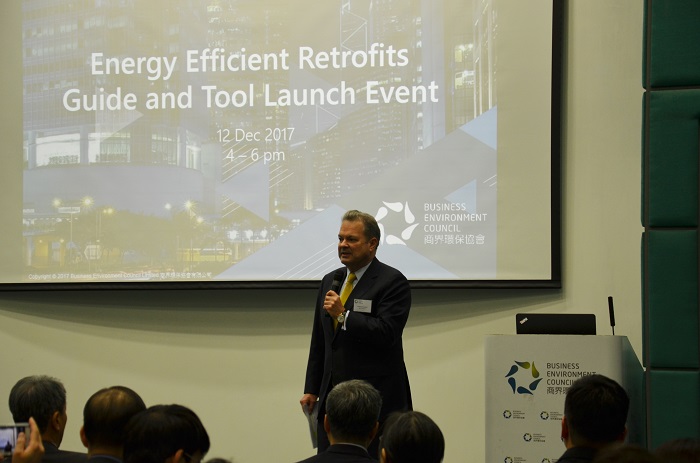
Mr Richard Lancaster, BEC Chairman, delivers the opening remarks
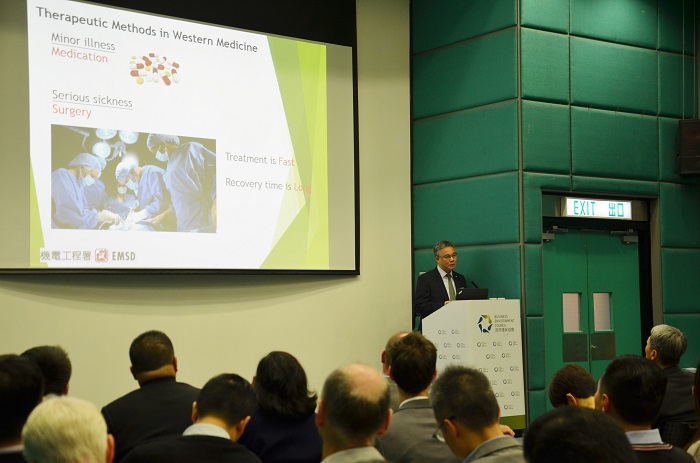
Ir Raymond Poon, Assistant Director Electricity and Energy Efficiency, EMSD, delivers the keynote speech
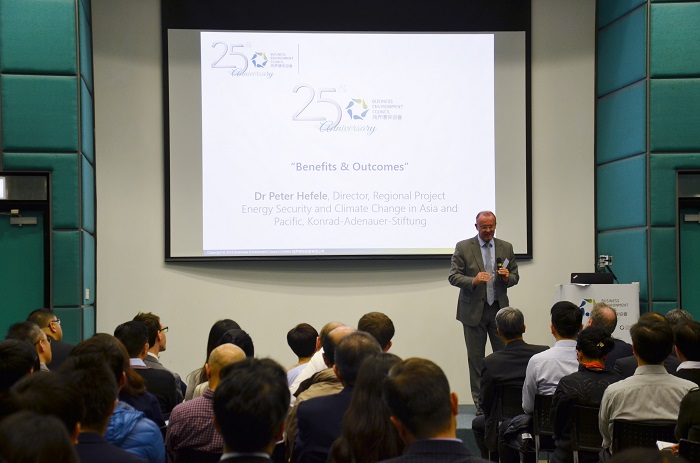
Dr Peter Hefele, Director, Regional Project Energy Security and Climate Change in Asia and Pacific, Konrad-Adenauer-Stiftung, talks about the benefits and outcomes of the project
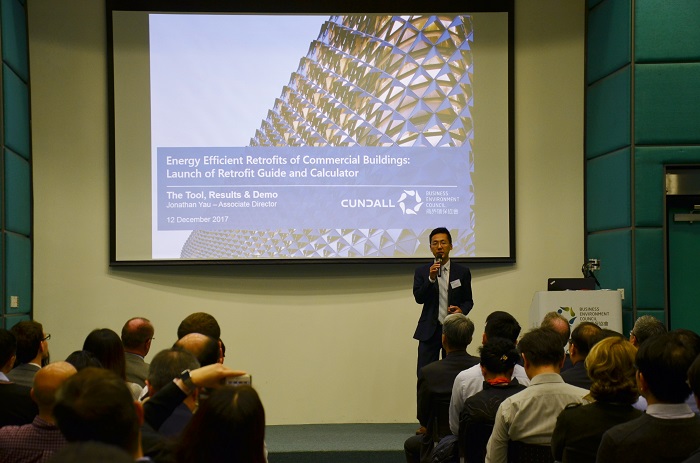
Mr Jonathan Yau, Associate Director, Cundall Hong Kong Limited, gives a presentation on the Guide and the Calculator
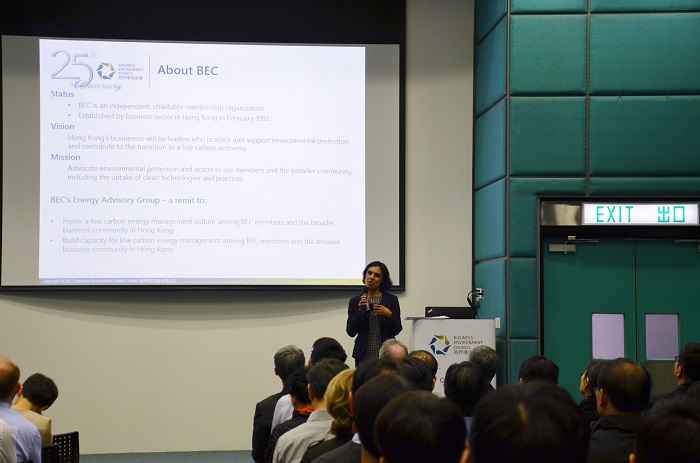
Ms Maya de Souza, BEC Assistant Director – Policy Research, gives an introduction to the Guide
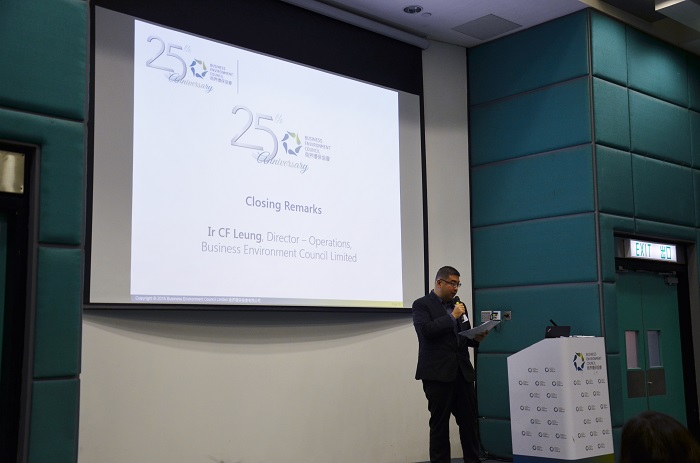
Ir CF Leung, BEC Director – Operations, delivers the closing remarks
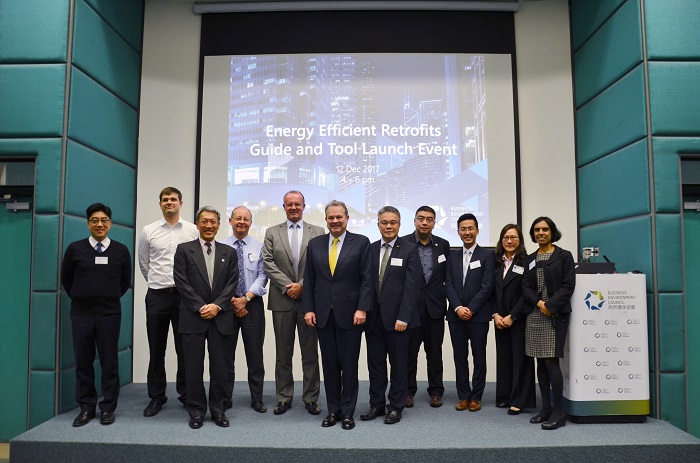
(From left to right) Ir Dr Raymond Yau, BEC Board Director; Mr Tyler Holland, BEC Energy AG ordinary member; Mr Adam Koo, CEO of BEC; Mr Jim Taylor, BEC Energy AG Steering Committee member; Dr Peter Hefele, Director, Regional Project Energy Security and Climate Change in Asia and Pacific, Konrad-Adenauer-Stiftung; Mr Richard Lancaster, BEC Chairman; Ir Raymond Poon, Assistant Director Electricity and Energy Efficiency, EMSD; Ir CF Leung, BEC Director – Operations; Mr Jonathan Yau, Associate Director, Cundall Hong Kong Limited; Ms Martha Hao, BEC Energy AG ordinary member; Ms Maya de Souza, BEC Assistant Director – Policy Research
